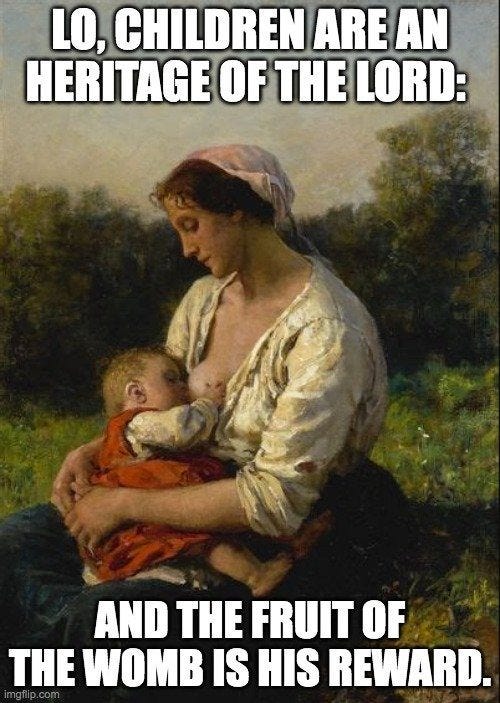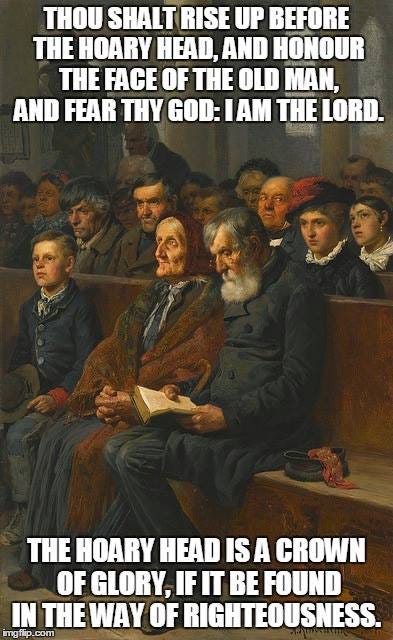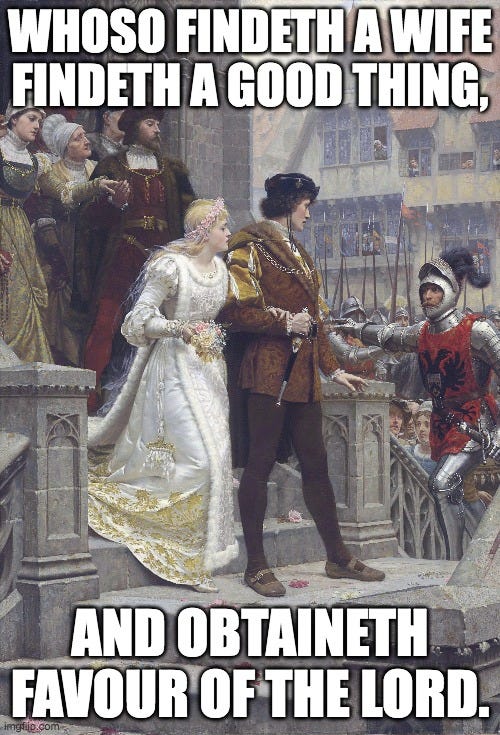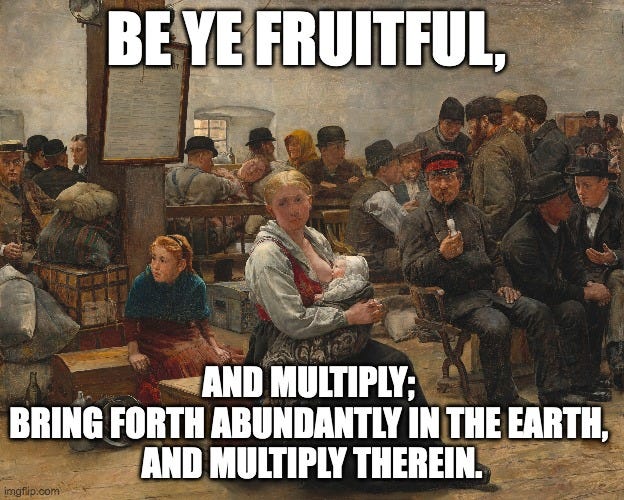Problems with Patterns of Patriarchy
A response to Lorenzo from Oz
I read a fascinating article by Lorenzo from Oz, which was cross-posted by Helen Dale. I think the article was well worth reading and a decent attack on a lot of progressive nonsense. It got me thinking about the subject, which prompted me to write a reply post. If the author ever sees my post, well and good, I will be happy to reply to him or anyone else.
Definition
The article starts with a definition of patriarchy. Or, better, definitions. Because it seems to me that it lists or implies at least three definitions of patriarchy and misses the actual definition. Here are some of the definitions it lists or implies:
1) The presumption that authority is male
2) Acting on (1) (Which he states as “the more strongly a society operates on the presumption that authority is male, the more patriarchal it is”.)
Before I go on to the others, notice that these two are, if not contradictory, at least in tension. It is one thing for a society to ‘presume’ that males are in authority, it is rather a different one for them to be so. Although they might normally act together, you could have either one without the other.
3) The status of males is higher than women. Although he puts this almost as ‘women have lower status’. This is even more in tension with the two above. The British King has great status but almost negative authority. He is less allowed to speak on issues of politics than any other citizen of the country.
4) Prestige. Status and prestige may be linked, and prestige and authority may be linked, but they are far from the same thing. Low-prestige people may exercise great authority. “The power behind the throne’ is one name for that trope. “The deep state” might be another one.
Now given that I am a student of the Scriptures and have studied the issue of ‘patriarchy’ in particular, I immediately started looking up definitions:
Acts 7:8-9 And he gave him the covenant of circumcision: and so Abraham begat Isaac, and circumcised him the eighth day; and Isaac begat Jacob; and Jacob begat the twelve patriarchs.
And the patriarchs, moved with envy, sold Joseph into Egypt: but God was with him,
G3966 (Strong)
πατριάρχης
patriarchēs
pat-ree-arkh'-ace
From G3965 and G757; a progenitor (“patriarch”): - patriarch.
G3965 (Strong)
πατριά
patria
pat-ree-ah'
As if feminine of a derivative of G3962; paternal descent, that is, (concretely) a group of families or a whole race (nation): - family, kindred, lineage.
G757 (Strong)
ἄρχω
archō
ar'-kho
A primary verb; to be first (in political rank or power): - reign (rule) over.
Strongs Concordance
PA'TRIARCHY, noun The jurisdiction of a patriarch; a patriarchate.
PA'TRIARCH, noun [Latin patriarcha; Gr. a family, father, and a chief.]
1. The father and ruler of a family; one who governs by paternal right. It is usually applied to the progenitors of the Israelites, Abraham, Isaac, Jacob and the sons of Jacob, or to the heads of families before the flood; as the antediluvian patriarchs.
2. A learned and distinguished character among the Jews.
3. In the christian church, a dignitary superior to the order of archbishops; as the patriarch of Constantinople, of Alexandria, or of Ephesus.
Webster’s 1828
patriarch
pā′trē-ärk″
noun
A man who rules a family, clan, or tribe.
One of the antediluvian progenitors of the human race, from Adam to Noah.
Abraham, Isaac, Jacob, or any of Jacob's 12 sons, the eponymous progenitors of the 12 tribes of Israel.
The American Heritage® Dictionary of the English Language, 5th Edition.
patriarch
pa· tri· arch ˈpā-trē-ˌärk
1
a
: one of the scriptural fathers of the human race or of the Hebrew people
Abraham was a patriarch of the Israelites.
b
: a man who is father or founder
The newspaper patriarch celebrated his 90th birthday.
c
(1)
: the oldest member or representative of a group
the cypress … is the patriarch of native trees, going back to the time of the dinosaur
—Amer. Guide Series: Texas
(2)
: a venerable old man
a whiskered patriarch, spry for his age
—Frank Sullivan
d
: a man who is head of a patriarchy
Miriam Webster Online
patriarchy
pa· tri· ar· chy ˈpā-trē-ˌär-kē
pluralpatriarchies
1
: social organization marked by the supremacy of the father in the clan or family, the legal dependence of wives and children, and the reckoning of descent and inheritance in the male line
broadly : control by men of a disproportionately large share of power
2
: a society or institution organized according to the principles or practices of patriarchy
For 20 years the country was ruled as a patriarchy.
Miriam Webster Online
Outside of various religious titles, one thing we notice that is present in all of the above definitions of patriarchy but not in the definition in Lorenzo’s article is… a father. A father, progenitor, grandfather, great… grandfather, etc. And almost all of them add the idea of ‘power’.
Which is the literal meaning of the words: Patri-archus: father-ruler.
This problem with his definition(s) runs into the entire paper. He jumps from definition to definition, from presumption to status to prestige, and never ties anything back to the actual, historical definition. A patriarchal society, both from the old definitions and from an examination of history, is one in which fathers rule. Societies with strong family jurisdictions where the male head of multiple households, even after he is dead, continues to have strong actual authority. People actually do what he says. Father-ruler.
Thus a patriarchal society is one in which fathers rule, and the more that fathers (and the adjacent) rule, the stronger a society is patriarchally.
Proverbs 1:8-9 My son, hear the instruction of thy father, and forsake not the law of thy mother:
For they shall be an ornament of grace unto thy head, and chains about thy neck.
Logically Adjacent
One important issue in the study of patriarchy is the concept of ‘logically adjacent’. If one looks at patriarchy as meaning the authority of the male head of a large, generationally extended family (the ‘patriarchs’ in Scripture had been dead for generations, and their offspring had become whole tribes), then one can look at positions that are logically adjacent to these men and see how they fit into ‘the patriarchy’.
So a grandfather sitting around and looking at his dozens of grandchildren, who hang on his every word, can see himself as logically adjacent to a Biblical patriarch. He hasn’t arrived yet. That won’t come, if it does, for a few hundred more years, but he is on his way. He has some of the attributes, even if not all of them.
The man who has his first child, especially his first son (who would be expected to stay in the clan and not marry out and thus stay under his father’s authority) can see himself as on the path to patriarchy.
But notice who else is logically adjacent! The grandmother sitting next to her husband is adjacent to adjacent. Her husband is one step away from being a patriarch (he’s not dead yet, and we haven’t seen whether generations to come will follow him. See Jeremiah 35). Her son is two steps away from being a patriarch; he does not yet even have grandchildren. But the grandmother is also two steps from being a patriarch. She is the wife of the to-be patriarch; her authority is just under his, and there is a clan of grandchildren that pay her homage. She probably even has a special name!
And this is not just splitting logic. Patriarchal societies, in general, have multiple systems for signalling respect, and as far as I know, all of them pay great homage to grandmothers. As long as they are seen as adjacent to the grandfather (i.e. not coming out from under his authority), her word, too, is law for her offspring.
This means that the mother bearing her first child is also on that path. And the girl getting married. In a patriarchal society, everyone is on some step of the ladder of ‘patriarch adjacent’. The only people who have arrived are dead.
Offspring
Another extremely important issue when speaking about patriarchy is the hugely important role of children. If one starts with the definition of patriarch, meaning ‘father-ruler’, then one can easily make the jump to see that children are important.
History makes it incredibly evident, and so much of the rest of his paper makes so much more sense if you realise that the fundamental precepts for a budding patriarch are:
1) Have lots of legitimate children
2) Have power over them
3) Have that power over them carry on down through the generations
Every time a patriarch engenders a new child, he potentially increases his patriarchalness. Why would women get married younger in a patriarchal society? Well, because the earlier they marry, the more children they are able to bear for their husbands, and the more adjacent they both will be to patriarchy! The younger a man gets married, the more time he will have to influence his children!
The paper speaks of status and prestige: in a patriarchal society, these are both increased by getting married and having lots of children. And when your children do so, or even your siblings.
In a patriarchal society, the acts of the children affect the status of the parents, especially the father. When I was younger (and our society was more patriarchal), a common expression of a father beating or berating his child was, ‘No son of mine acts like that!’. This expression reflected the father’s view of his status: the actions of his child reflected on him. A child would say, “In our house we…” and would not just be expressing a rule, but a lineage.
And this is not just a Christian issue; it applies from an evolutionary perspective as well. The whole point of evolution is to pass along your genes. Having multiple children and multiple successful children who could be expected to continue to pass on the genes is the pathway to evolutionary success.
Teams, Cliques, and Arranged Marriages
I loved his take on proactive vs. reactive aggression. And I loved his take on teams vs. cliques. But I saw an issue that he didn’t mention that addresses the team/clique issue from the opposite direction.
He stated that men like to form male-only groups so they would be able to plan aggression against a female’s kin. But I propose that their societies engaged in arranged marriages, or marriages of state, precisely to make that kind of aggression more difficult.
Which is to take nothing away from his point but to add to it. Society needs a way to protect itself, and if female kin relations will prevent an adequate defence, then something must militate against that. However, societies also need a way to simmer down long-standing tensions, and arranged marriages are a way to promote that.
If a leader in a society that is at war (hot or cold) against another society becomes involved in an arranged marriage, all of the patriarchal pressures work toward calming the situation down. The male who receives the female at the same time gains status (by gaining a way of producing offspring at the expense of the other group) and also gains kin relations, which means that his offspring by this woman become part of the patriarchal status of the other group!
And, of course, it becomes harder for the males to meet and plan aggression when one of them is in an intimate relationship with a high-status member of the other group.
Kin Groups
Patriarchy does not merely operate linearly but horizontally. The father of a given offspring is not the only one gaining status from their fertility and good behaviour, but their uncle as well. This should be obvious from an evolutionary standpoint, and of course, it is directly taught from a religious standpoint. It is not only the father that is important, but the father-in-law, the brother-in-law and the cousins on both sides.
Evolutionary Thinking
The last issue I would like to address is one that always leaves me shaking my head. The author castigates a whole list of thinkers for failing to have an evolutionary mindset and then says, “Nothing in biology makes sense except in the light of evolution”. And he is tying this all together with his view of patriarchy.
What I want to ask the author is… compared to what? What in his paper could I, as an ardent creationist, not understand? Which of the behaviours that he listed are incomprehensible from a creationist mindset? When he says (without evidence or a shred of possibility) that a given behaviour evolved over thousands of years to promote successful societies, why cannot I say ‘God designed mankind so that…”?
I understand and agree with him in his castigation of modern people who look at biological and cultural imperatives as if they arose whole cloth in the internet age. I can (and often do) speak of women’s breasts as being (I would say ‘designed’ he would say ‘evolved) to both attract men and provide nourishment to children. We can fully agree on the statement that a woman with seemingly adequate breasts, wide hips, and regular facial features … that these may all serve as attractions to the man who, instinctively, wishes to have sex with a woman who can successfully bear his children.
But why on earth does he think that this makes sense only if man evolved and not if we were created by God or designed by the aliens from Argozados? When you look back and see that a given trait might have caused cavemen or Egyptians to be more successful than if they had lacked that trait, that’s a good thing to notice. But how does it point to evolution?
Conclusion
The Scriptures teach a blatant patriarchy, which our world wishes to reject. The author here rightly castigates modern thinkers for failing to understand the basic principles that underlie patriarchal culture and the benefits it provided and still provides to human cultural groups and societies. I think he had some blind spots which made his picture of patriarchy fuzzier than it needed to be, and I hope I have cleared some of them up.
Speaking as a Christian, we worship God as Father. Anything that takes away from a clear view of that is highly problematic both to orthodoxy and orthopraxy. We need to take our cultural blinders off and see Scripture and human history as it is, not as the internet would like it to be.
I love comments, and especially love comments that disagree in an intelligent way. If anyone reads this post, finds it interesting, and would like to get involved in an exchange of ideas, I’m your man. Put in a comment, and let’s get it done.








